 University Student Korean-American First Generation American Female LGBTQ Q: What do you have in common with your teachers? A: Often, I don't have that much in common with my teachers, unfortunately. I respect all of the teachers who have been in my life, and I've been lucky enough to have been in the care of several who were exceptional, but I'd be hard-pressed to name a teacher I could be grouped with in a game of Guess Who without tipping the whole board. What I share with my teachers is typically what I share with my city: we're WEIRD (Western, Educated, Industrialized, Rich, and Democratic). In short, traits that don't really do much, on their own, to expand students' horizons or kindle a real desire to sacrifice the wealth we take for granted to spark change in the world that levels the playing field. Q: Does it matter that students and teachers have things in common? A: Yes, when--as exceptions to the rule--I find that I share identities with my teacher, I am often also blessed with a mentor who can help me navigate my identities as they did at my age. Teachers have such a unique, pivotal role in the lives of so many students. Students turn to their teachers for help on so many things, especially as they're stumbling through elementary, middle, and high school and learning to suppress their "unfavorable" identities and express others. This is the period of life where kids come back home upset that their packed lunches are "too Asian", that their way of dressing or acting is somehow "gay" and therefore offensive, or that their economic standing is something to be ashamed of. Since they seek to discipline us and guide us, our teachers are in effect 6-hour+ daily stand-ins for our parents. And like parents, love them or hate them, they shape our relationships with ourselves immensely. For better or for worse, they hold this sway when we are at our most vulnerable and most desperate to fit in. Unfortunately, with a primarily cishet female, white, able-bodied, and college-educated pool of teachers, this influence may be for the worse. This group is the group to shape students ideas of how they or their parents should look and act in an America where white, straight, rich and able-bodied people are still upheld as the golden standard. This group is so often unhelpful when the really tough questions come up--the ones that make or break a student's desire to succeed in school, the ones that at their core ask "do I belong here?" or "is the way I'm feeling valid?" This group is ill-equipped to handle transitioning students, first-gen students, students of color, and all others who don't fit neatly into the Guess Who board. This group needs to change, so that students can find mentors to connect with and rely on. Bae is getting ready to start her second year at Stanford University where she is the Co-Chair of the student group Queer & Asian. See her beautiful and meticulous notes from class on Instagram at @its_the_bae_area. Photo (c) 2017 Kristin Leong
0 Comments
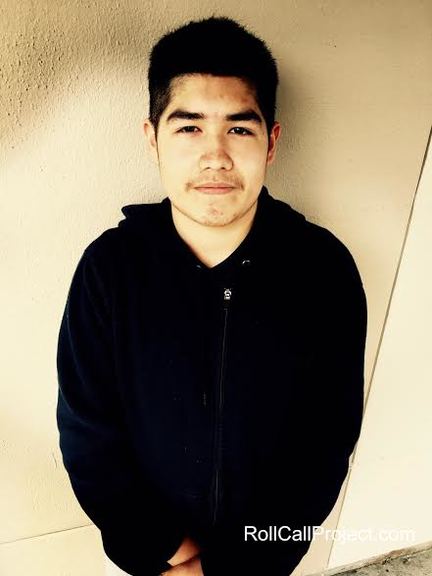 High School Student Hispanic Male Will be the first in his family to go to college Q: What do you have in common with your teachers? A: To me, there are still a lot of things we don't know about our teachers. As students, we go through a lot. We experience things that are either good or bad. We have teachers and our school staff that talk to us, who tell us that everything is gonna be alright and let us know that they are there for us. It is only at the time of disbelief and grief where we share that connection. Most of them may be white and there may be more female than male teachers, but that doesn't matter to me. The connection that I have to my teachers is something else. I also see it with other students as well. We are a small community where we all go to learn, to laugh, to share, and to express ourselves. Teachers are really there to help us no matter how troubled we are, whether we're stuck on a problem or we're going through some troubling times, they are there for us. They laugh and even share some stuff that you never even knew you had in common with. I've also seen some teachers experience the same things that we do too. I see them talk about their personal lives, hear them make jokes. I've also seen some of my teachers at their lowest point. We as a society treat our teachers as machines. We go in, sit down, learn, and move on to the next. But that is not true. We don't truly see what our teachers are. I am truly grateful for the community that I am a part of. Teachers' experiences and knowing the things that we have or may not have in common has helped me do things that I may never have thought I was capable of. Like expressing myself and be able to share my story. Q: Does it matter that students and teachers have things in common? A: I know that it may be hard for others to express themselves and I understand. But all I want for people to understand is that there a lot of things we don't know about our teachers, and it is difficult to make a connection with someone you may not know a lot about. To me, it does matter that students and teachers have something in common. It builds that personal connection. And even though you may or may not have something in common with your teachers, it builds that sense of communication and trust. No matter who we or they are. No matter what race, gender, sexual orientation, or even who you are truly. Having that connection turns a school into a community and makes our teachers and students into a family, no matter if you have something in common or not. Connect with Alexis on Twitter @ASVideoGamer. Photo (c) 2017 Kristin Leong 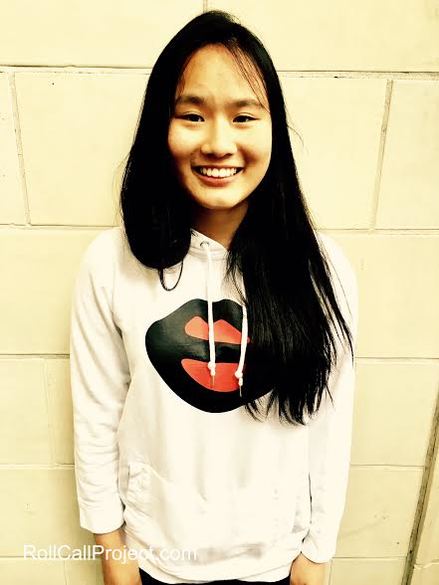 High School Student Chinese Immigrant Female Will be the first in her family to go to college Q: What do you have in common with your teachers? A: I really couldn't think of anything off of the top of my head. This question took way longer than it should have. My math tutor is a huge nerd, we talk about Game of Thrones all the time. Then somehow I recommended a TV show on Netflix to my biology teacher, so I guess that's that. All my teachers are female? Does that even count? I think after I began developing a passion for education, I started relating to some teachers more because I can see their passion and how they care for students. This is a really hard question. Q: Does it matter that students and teachers have things in common? A: Most parents from my ethnic background would say it doesn't matter. As long as the students learn the appropriate materials and are well prepared for standardized tests, it doesn't matter if the teacher is approachable or not. But most students would agree it does matter. When the teacher cracks that one joke, references that one TV show or movie we like, I think we all suddenly become fond of them. We become willing to listen. I think we all learn better when we like the teacher. We grow to like the class, the the subject, then other subjects in that field. We become less scared to ask seemingly stupid questions, and we begin to learn at a much more productive pace. I remember when I first moved to the US in third grade, I could barely speak any English. There was a counselor who spoke Chinese. I suddenly felt so much better, and just a little bit less lonely. And that made learning English and becoming part of the community that much easier. BUT then again, we seem to be influenced by teachers that have no commonality with us. When I see my biology teacher ramble on and on about how amazing biology is, I get somewhat touched. And I start listening because the examples she gives us are so profound that it made a STEM class interesting. When my usually strict algebra teacher told the class we could talk to her and push the homework due dates back if we wanted to priotize AP tests instead (she literally said "don't do your math homework. This is not important. AP tests are important"), I became somewhat touched. And I started listening to her lectures because I knew she is a good teacher, and she really cares. So I guess what I'm trying to say is, similarities matter. It forms instant bonds between students and teachers. But even if we couldn't form that bond, students will evetually see a good teacher's passion, and grow to respect them, to open up to them. I don't know though, respect is respect, but trust is another thing. It definitly helps if the person we're supposed to open up to has had similar experiences. We'll know they understand that way. Photo (c) 2017 Kristin Leong 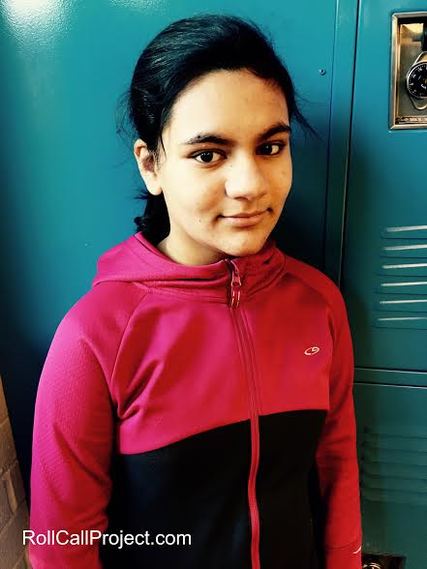 Middle School Student Indian Female Q: What do you have in common with your teachers? A: I like having things in common with my teachers. When I was India I had three things in common with all my teachers in each grade. All my teachers were Indian just like me, they spoke the same language as me, and they were all female like me. There are very few male teachers in India, most of then are female. Also one more thing I had in common with my teachers in India was that they were the same race as me. In India I had a lot of things in common with all of my teachers. But in America now I have very few things in common with my teachers. At my elementary school, I had one thing common with my art teacher. We both liked art. I was always excited when we had art. My teacher appreciated me, and we could talk about art. I was sad when I didn't have her as my teacher the next year. I always enjoyed art. What I had learned was that the more you have in common with your teachers the more you pay attention in class with them. You do not goof up, and get in trouble. You have fun being in their class. That is what happened to me. I had fun being in my art teacher’s class. This year in middle school, I had one thing common with my French teacher. We both liked French. Since I had this thing in common with her, I really like French class. I pay more attention, which helps learn French better. The more I understood French better, the better my French grade was. What I learned was that the more you like your teacher, the more you would try to get a good grade in that class. If you do not have anything in common with your teachers then you will probably not like your teachers. In addition, this year I had one more thing in common with my International Studies, we liked human geography. Every time I had International Studies, I would be excited to learn. I also understood better. When I learned that in 2nd semester I was not going to have her, I was sad. Now I have a new International Studies teacher. Q: Does it matter that students and teachers have things in common? A: Yes, it definitely matters that students and teachers have things in common. When teachers and students have things in common, they interact more with each. They get to know each other. Students pay more attention, they like their teacher. If you have nothing in common with your teacher, then you probably will not like the class. You also will not be able to focus in class much. There are kids who do not have anything in common with some of their teachers or maybe all of them, and it is hard for them to focus in school. Some students try to find things they have in common with their teachers, and they find it. Then they can start to know their teachers better. Students and teachers can talk about the same thing if they have things in common. The thing is that students can get in trouble if they do not have things in common. What happens is that they will not like their teacher because they do not have anything in common with them. They will goof in class, and not pay attention. This is why it does matter for students and teachers to have things in common. Photo (c) 2017 Kristin Leong 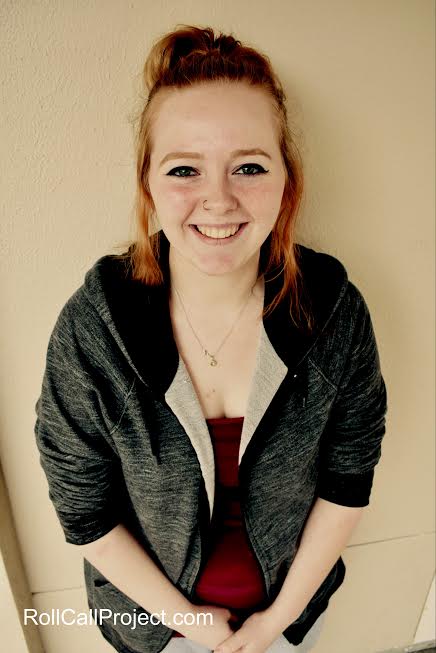 High School Student White Female Adopted Q: What do you have in common with your teachers? A: I think the biggest thing my teachers and I have in common is our races, genders, and our backgrounds. My teachers and I have similar backgrounds in the sense that we all have been through something. I love that with all my teachers, whether past teachers or present teachers, I can talk to them about anything. Especially with Mr. Townsend, because he and so many of my other teachers are so easy to talk to, I have been able to open up and talk about something that has affected me enormously. The community I have at my high school and the wonderful connections I have with my teachers are really important to me. Mr. Townsend has allowed me to be able to write about my experience with my father’s drug abuse. Writing about it has shown me how important it is to understand it. When I was in middle school, I went through some rough stuff where my parents split up and divorced and my father fully set towards drug abuse and addiction. In middle school I didn’t really have anybody to talk to about what was going on in my life and how it affected me. When I got into high school I finally found teachers that actually cared about me and who I felt I could open up to. I got Mr. Townsend in my sophomore year and now I also have him in my junior year. He has been here for my no matter what. He has also given me more chances to learn more about what my father is going through and how I can cope with it. Q: Does it matter that students and teachers have things in common? A: In my opinion, yes. Only because the connections I have with my teachers were all based off of our common likes and experiences. In my freshman year, I lost my grandma who I was living with at the time. Through losing her, I pushed away a lot of people and started to fall short in school. The teachers I had that freshman year talked to me and tried to understand me during that time period. They began to understand what I was going through because most of them have lost someone as well in their lifetimes. My teachers tried to just be there for me and tried not to push me into doing things and saying things that I wasn’t ready for. My history teacher in freshman year, who I have this year as well, has always been one of the teachers that has tried to watch over me and be there for me through my harshest and worst times. When I came into class the day after my grandma died, he tried to talk to me and understand me to ensure I was okay. All of my teachers care about us. I know this because they all talk to us, not only as students but as people. To them we aren’t just students, we are individuals that actually matter. I think in most schools, teachers and students don’t always form the best relationships and most students don’t feel that teachers care about them. Here, all these teachers feel for us. They want to help us and want us to do better. Our teachers want us to go to college, get jobs, and just pursue life. This relationships I share with my teachers are the only reasons I am even remotely successful in class or in school in general. I don’t know what I would do without the connections I have with my teachers. Leah hopes to become a pediatrician or child psychologist someday. She says, "I like being surrounded by people who I can help." To hear more about Leah's journey, watch this video of Kristin Leong's opening talk for Town Hall Seattle's #EducationSoWhite event. To meet Cameron Townsend, Leah's teacher, go here. Photo (c) 2017 Kristin Leong 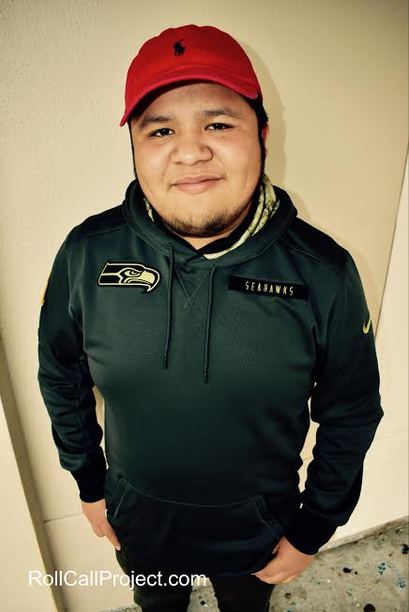 High School Student Hispanic Straight Male Will be the first in his family to graduate from high school Q: What do you have in common with your teachers? A: I think I do have stuff in common with some of my teachers because they tell us their life experiences and I can relate to them. But then there's some teachers that I can't relate to because of their race or their gender because I'm going through different things in life than what they went through. They try helping out, but it's a better help if the person that is trying to help knows what you're going through and knows how you're feeling because they were there at one point. Q: Does it matter that students and teachers have things in common? A: I think it does matter if you and your teachers have things in common. If students and teachers had things in common if you need someone to talk to they are there for you, they know what's going on with you, you have more trust in them, and you can feel like you can open up with them and share your feelings. Gustavo hopes to attend Seattle Pacific University or Washington State University after he graduates. He's interested in studying automotive technology, video production, and photography. Photo (c) 2017 Kristin Leong 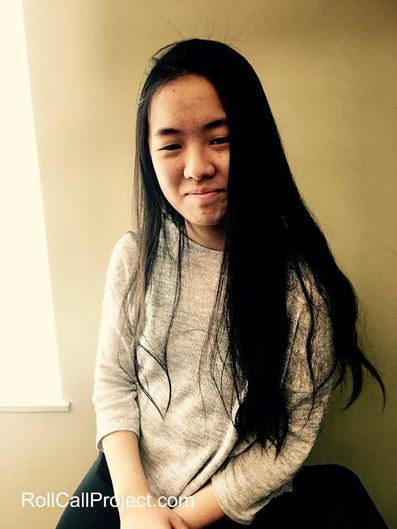 Middle School Student Japanese Female Q: What do you have in common with your teachers? A: “You follow MY rules in MY room.” First, it is not your room. It is the school's room. Second, why even have rules? Third, why should I even listen to you? Fourth, I really hate that voice of yours. These are my first four thought that come to mind when the teacher says the rules. I am Asian. I am female. I am tall. I have glasses. I do not follow the rules. In fact, I hate the rules. I never have had much in common with my teachers. I have had a few things in common, like gender, or family, or what I favor. However, one thing I had never had in common with my teachers was having an all-Asian teacher. In addition, I have never met or had a teacher with as much opposition towards rules as much as me. I remember that back in 5th grade, I had a Norwegian female teacher, who was very strict and expected a lot out of us. She was the bane of my fifth grade school life. And since our class was so boisterous, she was a pain. For all of us. I think that the biggest reason that I disliked her was because she had a chart of rules. And I always broke them. In addition, for some reason the teacher disliked me so I was punished. If some of the teacher’s pets broke the rules, they were not punished. For an example, I broke the rule, “No talking in class while the teacher was talking.” I was punished by staying in for my recess. The other kid who was talking to me should have been punished too. But she wasn't, since she was favored. My teacher obviously did not like me. I was fine with her not liking me, because I did not like her. From having this teacher, I learned that rules are rules and if I do not follow them, the teacher will dislike me and I will have a terrible year. I want to be who I truly am so I won’t change how I act in front of teachers or other people. Because I do not want to. Q: Does it matter that students and teachers have things in common? A: Yes, I think that having things in common with your teacher is very important. When we have things in common with our teachers, we can solve problems easier and we can have fewer problems. Though it is important to have things in common, we cannot always have things in common, and if we do, we must cherish them. For me, it is very important to have someone who I can rely on and relate to. Whether that is a friend, or a family member, or a teacher, it is very important to have someone to relate to. I honestly do not like counselors. It seems like they understand you. However, humans cannot understand everyone’s feelings. We are humans. So we tend to take sides. It's human nature and we cannot deny it. I really felt this when I was involved in a problem with a fellow classmate in 5th grade. She had misunderstood what I said and was hurt and had started crying. I tried to explain but the teacher and the counselor took sides with the crying one. So I couldn’t really do anything. I am not sure if being Asian effects any of this, but one thing for sure is that in my family, I am taught not to keep all of my emotions in and stress over them. Therefore, if it is appropriate, I will say what is on my mind. However, teachers on the other hand want "school-appropriate conversations" and they want people to feel comfortable. Not saying that I disagree, but we should be able to express our feeling and not be punished. Photo (c) 2017 Kristin Leong |
ROLL CALLHumanizing the gaps separating teachers and students. Archives
December 2020
Categories
All
|
Proudly powered by Weebly

 RSS Feed
RSS Feed